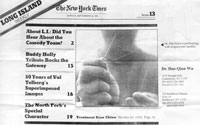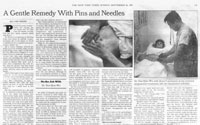 |
 |
- LONG ISLAND WEEKLY)
THE NEW YORK TIMES, SUNDAY,
SEPTEMBER 26, 1993
A Gentle Remedy With Pin and Needles By: Cathy Singer
“Patients really friends.” Those are among the few words that Dr. Dao Qian Wu knows in English, but they speak volumes about who he is.
Dr. Wu is an acupuncturist working from two clinics in Suffolk County , including one at his house in North Lindenhurst . He is a gentle man practicing gentle art.
On a recent Monday several patients sat in the waiting room, actually his living room, eager to talk about Dr. Wu. Most were refugees of traditional Western medicine, fleeing physicians who, they said, charged too much and provided too little. After innumerable doctor’s visits and thousands of dollars they were still in pain, they complained. But with Dr. Wu, they all agreed, they had found relief from pain from a physician who works with his heart as well as his hands.
Anna Colantuono of Bay Shore was seeing Dr. Wu for severe rheumatoid arthritis, which she had for years. “It is a very complicated and nasty disease,” Mrs. Colantuono, 47, said. “I called doctors who told me that there’s no cure. It can be controlled, they said, but I would have to live with it.”
But she could barely live, she added, in addition to the stiffness, swelling of her joints and fatigue that battered her daily, some treatments, although effective in the short term, wreaked further havoc with her body. The worst, she said, were gold shots, commonly prescribed injections of a compound containing gold, that she received for eight years. “They were toxic,” she said. “And they ate away my stomach. They ruined my digestive system. I had constant diarrhea. I felt weaker than when I began. I lost weight and I was always getting sick. All I wanted to do was sleep.”
Two summers ago Mrs. Colantuono met Dr. Wu. She was in tremendous pain. “I couldn’t touch her,” Dr. Wu recalled. “She screamed.”
Even my husband couldn’t touch my hands,” Mrs. Colantuono said, “because I’d scream.”
With 15 to 20 hair-thin needles inserted in acupuncture points in the stomach, hands, ankles and knees two times a week, she said her diarrhea went away, her hands were no longer red, and the joints shrank to half the size they had been.
“I went through hell for 10 years,” she said. “Now I wake up in the morning and feel like a human being. Now I can dance at parties. Now I never get sick. Dr. Wu just put me back together. He has human compassion. He heals me with the heart. I didn’t get that with my doctors.”
Mrs. Colantuono has recommended Dr. Wu to others, including her brother-in-law, who smoked cigarettes for almost 30 years. She said he kicked the habit after three treatments of acupuncture and acupressure, a patch containing herbs pressed onto the ear. Dr. Wu has also used acupuncture to treat her son’s bronchitis and her daughter’s sinus allergies and severe sore throat.
While Dr. Wu tended to his patients, his elder son, James, 25, an acupuncturist in Maryland, talked about his father, who trained in Western and Chinese medicine in China and was chief physician at the People’s Hospital of Xingjing in northwestern China, near the Russian border. Dr. Wu immigrated to the United States in 1980, following his mother and sister to Long Island . His wife, a nurse, now called Sherry, remained in China with James and his younger brother Andrew.
Like most new immigrants, Dr. Wu’s life was difficult. Although he had a prestigious position in China , here he had no professional standing.
He spoke no English and could not become licensed in New York . He assisted a Korean-American doctor who owns an acupuncture clinic in Huntington and studied English until he could take the acupuncture-licensing examination in 1985.
Two years later Dr. Wu’s wife and sons arrived. By then Dr. Wu was living in his house in North Lindenhurst . In 1990, in addition to his clinic work, he began to build up his practice, with his wife as his assistant.
Now he sees 60 patients over three days each week at his house, where a garage has been transformed into a small clinic. A statue of the body, with acupuncture points outlined, stands in the waiting room, which also features magazines like Time, The National Geographic and National Wildlife stacked high. On top of one pile is a recent issue of Business Week, with a cover on “ China – the Making of an Economic Giant.”
“My father built up his practice by passion, heart and skill,” Mr. Wu said. “Patients just love him. Even through the language barrier they feel the passion and see the skill. And he has built up his practice without advertising, only through word of mouth.”
He told how his father made himself available to patients whenever needed. “Since 1987”, Mr. Wu said, “he has gone to the house of one patient, who is paralyzed, every Saturday afternoon. He drives 40 minutes to Northport, provides acupuncture treatment and drives back.” Dr. Wu’s goal is to keep the man’s muscles from atrophying.
Mr. Wu said acupuncture worked in 80 to 85 percent of all cases, including those of his father. “If it doesn’t work.” Mr. Wu said, “he tells them to go to another doctor.”
After Dr. Wu and his wife gingerly walked a woman with multiple sclerosis into a treatment room he spoke about medicine and acupuncture. He said that in China 40 years ago Western and Chinese medicine were practiced together. In the United States practitioners rarely merged the two. “American doctors just not open eyes,” Dr. Wu said.
He continued to speak in Mandarin as his son translated. “A man who lives in the environment,” Dr. Wu said, “has to relate to the environment to be a perfectly functioning system. Chinese medicine considers a disease or illness to be related to all other organs. It doesn’t treat just one part. Western medicine has a lot of modern technology, but it is compartmentalized.”
Mr. Wu explained the theory behind acupuncture and Chinese medicine, which goes back 5,000 years. The body is a unique system in the universe, he said. There is yin and yang and the five elements of water, metal, earth, fire, and wood. Disease is caused by the imbalance or disharmony in the body of yin and yang, the elements and vital energy. Acupuncture, with the use of thin needles of varying lengths, stimulates the points related to disease by channeling vital energies and restoring harmony.
Shelly Evans of Long Beach looked to Dr. Wu to relieve her of the hot flashes related to menopause. She became acquainted with Dr. Wu when her husband, who has facial paralysis because of Bell’s palsy, began treatments three times a week in February. “Now that side of his face is practically normal,” she said in the waiting room while her husband underwent treatment.
Mrs. Evans, 51 started treatments in May, when she began “those famous hot flashes everybody talks about.” After four treatments in which needles were inserted into the middle of the forehead, the top of the head, the stomach, ankles and wrists, the flashes disappeared, she said, adding:
“I never went to the gynecologist. And I have no reason to think that they would have stopped on their own. Bu when I tell people about it they don’t believe me.”
At 1:15 a friend of Mrs. Colantuono, Maria Tuozzo, arrived exhausted because she had been lost for an hour on the Long Island Expressway driving from Port Washington . Her husband had seen Dr. Wu for a slipped disk, and she was seeking relief from a neck that chronically ached from tension. It was her second visit.
“When I left here the other night I really felt better,” said Mrs. Tuozzo, 48. “My neck had been hurting for a year, and nothing, no aspirin, Tylenol or Advil, ever worked.”
Dr. Wu showed her to a room, where she lay down on her left side. He inserted 10 needles into her neck and back, deciding on the locations “more or less by touch,” he said. The muscles in her upper back were particularly tight, so Dr. Wu inserted additional needles there.
“Dr. Wu,” Mrs. Tuozzo said, “I’m shaking. I feel nervous.”
“I’ll hold you,” he said as he put his arms around her and held her hand.
“Needles hurt?” he asked.
“No, I just feel nervous,” she said. Dr. Wu turned on a heat lamp and positioned it toward her. “Close your eyes,” he told her as he leaned over to hold her hands again. “Close your eyes. Forget everything else. Relax.”
Later that afternoon Diane Browne of Centerport, who has been going to Dr. Wu for three years, walked in. She had originally sought treatment from Dr. Wu for tinnitus, ringing in the ears. “I had gone to regular doctors,” Ms. Browne, 57, a retired school-teacher, said, “and they said, ‘Keep swallowing and you’ll be all right.’ ”
She went to the library and read about ear problems. In one book a physician was so adamant that acupuncture did not cure tinnitus that she was sure that it would. “That doctor protested so much,” Ms. Browne recalled. “My first thought when reading that was, ‘I have to find a good acupuncturist.’ ”
Her psychotherapist and masseuse recommended Dr. Wu, who said he thought her problems were related to hormones. Ms. Browne had also felt that the tinnitus might be related to menopause. “But when I told one doctor,” she said, “he laughed.”
Over the years, Ms. Browne said, the acupuncture has stopped the ringing, relieved her migraine headaches, ended hot flashes and cured her spastic colon. Now she goes twice a week for maintenance, or tuneups, as Dr. Wu calls them. “And sometimes they give me lunch,” Ms. Browne said. “It’s always Mrs. Wu’s cooking.”
Ms. Browne lay on a bed. Dr. Wu inserted the plugs of what looked like a small transistor radio into the ears. The unit was called Magic Needles, made in China , which, his son explained, works like acupuncture but without needles for chronic diseases. “It regulates the hormonal system.” he said.
Dr. Wu inserted needles into Ms. Browne’s feet, left ankle, belly, wrists, neck, near her ears and, because she complained of “a bit of a headache,” above her right eye. He also attached a device that emits low frequency low-intensity electrical impulses through contacts clipped onto the acupuncture needles. He put a white cloth over her eyes, and she lay still, so that she could begin to fall into what she called “an almost comalike nirvana state of relaxation.”
“Other people use heroin,” Ms. Browne said. “But I use acupuncture.” Dr. Wu smiled and quietly walked out of the room.